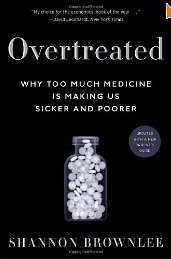February 28th, 2011 by Michael Kirsch, M.D. in Health Policy, Opinion
1 Comment »

Many folks criticize pharmaceutical companies for providing physicians’ offices with free drug samples. They claim that this giveaway harms consumers because drug companies must raise their prices to cover the costs of these freebies. Of course, this is undeniable. Any business expense, such as payroll or advertising, has to be covered and is expectedly borne by the consumer. If a company chooses not to advertise, outsources manufacturing to a country with cheaper labor, offers limited benefits to its employees, then they can sell their product at a low price. In this hypothetical example, anemic sales may doom the company quickly.
Naturally, free samples are not really free. The rest of us pay for them. While this is true, I don’t think it is evil. Unlike the U.S. government, at least drug companies are covering their costs and not simply borrowing money every year to meet budget. Interesting concept.
Two of the community hospitals I work at have undergone transformations. One is owned by the dominant health care behemoth in Cleveland and has just completed a near $200 million renovation and expansion. The other smaller hospital is one of the few remaining Cleveland area hospitals that are still independent. I’d like to sneak there at night and hoist up a “Live Free or Die” flag up the flagpole, to delebrate its independent streak, but I’m sure that there are video cameras everywhere and that I would be in violation of several bylaws. The apt punishment might be that I would have to spend a cold Cleveland night chainedto the flagpole reading electronic medical record manuals out loud. Read more »
*This blog post was originally published at MD Whistleblower*
February 18th, 2011 by Michael Kirsch, M.D. in Book Reviews, Opinion
No Comments »

 My daughter, Elana, home from college on winter break, offered me a book to peruse from one of her classes. She correctly suspected that her father, the MD Whistleblower, would enjoy reading a book authored by a whistleblower pro.
My daughter, Elana, home from college on winter break, offered me a book to peruse from one of her classes. She correctly suspected that her father, the MD Whistleblower, would enjoy reading a book authored by a whistleblower pro.
The book, “Overtreated: Why Too Much Medicine Is Making Us Sicker and Poorer” by Shannon Brownlee should be required reading for first year medical students, who have not yet acquired views and habits that promulgate excessive medical care and treatment. For those of us already in practice, this book should be a required element of board recertification.
Brownlee understands the medical system well and describes a culture of excess, conflicts of interests, absence of universal quality control mechanisms and fractured and disorganized care with no one in charge of a particular patient. She presents some chilling anecdotes of medical tragedies that have occurred at our most prestigious medical institutions. And she introduces us to reform leaders who understand the system’s inherent deficiencies and their proposals to remedy them.
Brownlee states that explanations for waste in the healthcare system include:
- Cost of a gargantuan bureaucracy
- Medical malpractice fear and defensive medicine
- Incentives for patients with medical insurance to overutilize care
- Rising medical costs
The most important cause, she argues, is unnecessary medical care, which costs the nations hundreds of billions of dollars and exposes patients to the risk of harm from medical complications. She writes, “If overtreatment were a disease, there would be a patient advocacy group out there raising money for a cure.” Read more »
*This blog post was originally published at MD Whistleblower*
February 11th, 2011 by Michael Kirsch, M.D. in Health Policy, Opinion
3 Comments »

I have previously posted on the ethics of paying for organ donation. I find this notion to be ethically troubling, but I believe the issue deserves fair debate. In general, my belief is that a personal anecdote should not drive policy in medical ethics. There are many individual vignettes that are poignant and heartbreaking that tempt us to relax our ethical boundaries.
For example, permitting us to harvest organs from folks who are “not quite dead,” would save lives, but society’s rights outweigh this benefit, in my view. For similar reasons, I resist efforts to relax the definition of death in order to increase the reservoir of available organs. If death is redefined as a result of a search for truth, then the process is ethically permissible. Participants in these discussions would include medical professionals, theologians, ethicists, legal experts and ordinary people.
If a result of this process would be that there would be more organs available for transplantation, then I would be supportive. The distinction is that increasing organ supply would not be the primary objective. In other words, I reject the approach of, “Hey, we need more organs to save lives. Let’s roll back the definition of death to get there.”
Recently, two sisters who were serving life sentences in Mississippi for a crime related to armed robbery were released by Governor Haley Barbour. They were not pardoned, but their sentences were indefinitely suspended. A condition of their release was that one woman must agree to donate a kidney to her sister.
The women have always maintained their innocence, and supporters have argued that the verdict was wrong or disproportionate to the crime. I am not knowledgeable on the facts and offer no view on the whether the verdict and sentence were just. Read more »
*This blog post was originally published at MD Whistleblower*
January 24th, 2011 by Michael Kirsch, M.D. in Better Health Network, Opinion
No Comments »

Medical ethics has properly gained a foothold in the public square. There is a national conversation about euthanasia, stem cell research, fertilization and embryo implantation techniques, end-of-life care, prenatal diagnosis of serious diseases, defining death to facilitate organ donation, cloning and financial conflicts of interest. Nearly every day, we read (or click) on a headline highlighting one of these or similar ethical controversies. These great issues hover over us.
We physicians face ethical dilemmas every day in the mundane world of our medical practices. They won’t appear in your newspapers or pop up on your smartphones, but they are real and they are important. Here is a sampling from the everyday ethical smorgasbord that your doctor faces. How would you act under the following scenarios?
— A physician has one appointment slot remaining on his schedule. Two patients have called requesting this same day appointment. The first patient who called has no insurance and owes the practice money. The second patient has medical insurance coverage. Neither patient is seriously ill. Who should get the appointment?
— Two hours before a doctor is to see a patient, her husband calls to relate private information that he fears the patient will not share with the physician. Should the physician disclose this conversation to the patient? What is the risk if she discovers at a later time that a confidential conversation occurred? Read more »
*This blog post was originally published at MD Whistleblower*
January 18th, 2011 by Michael Kirsch, M.D. in Better Health Network, Opinion
No Comments »

 Whistleblower readers know of my criticisms of the electronic medical record (EMR) juggernaut that is oozing over the medical landscape. Ultimately, this technology will make medical care better and easier to practice. All systems will be integrated, so that a physician will have instant access to his patients’ medical data from other physicians’ offices, emergency rooms and hospitals.
Whistleblower readers know of my criticisms of the electronic medical record (EMR) juggernaut that is oozing over the medical landscape. Ultimately, this technology will make medical care better and easier to practice. All systems will be integrated, so that a physician will have instant access to his patients’ medical data from other physicians’ offices, emergency rooms and hospitals.
In addition, data input in the physician’s office will use reliable voice activated technology, so that some antiquated physician behaviors, such as eye contact, can still occur. Clearly, EMR is in transition. I place it on the 40 yard line, a long way from a touch down or field goal position.
A colleague related a distressing meeting he had at the community hospital he works at. This hospital, like nearly every hospital in Cleveland, is owned by one of the two towering medical behemoths. I’m not a businessman, but I have learned that when something owns you, it’s generally better for the owner than the ownee. This meeting was about the hospital’s upcoming EMR policy. Sometimes, these hospital meetings are ostensibly to seek physician input, but the true purpose is to inform the medical staff about decisions that have already been made.
In the coming months, this hospital will adopt a computerized ordering system for all patients. In theory, this would be a welcome advance. It would create a digital and permanent record of all physician orders that could be accessed by all medical personnel involved in the patients’ care. It would solve the perennial problem of inscrutable physician handwriting, including mine. Read more »
*This blog post was originally published at MD Whistleblower*













